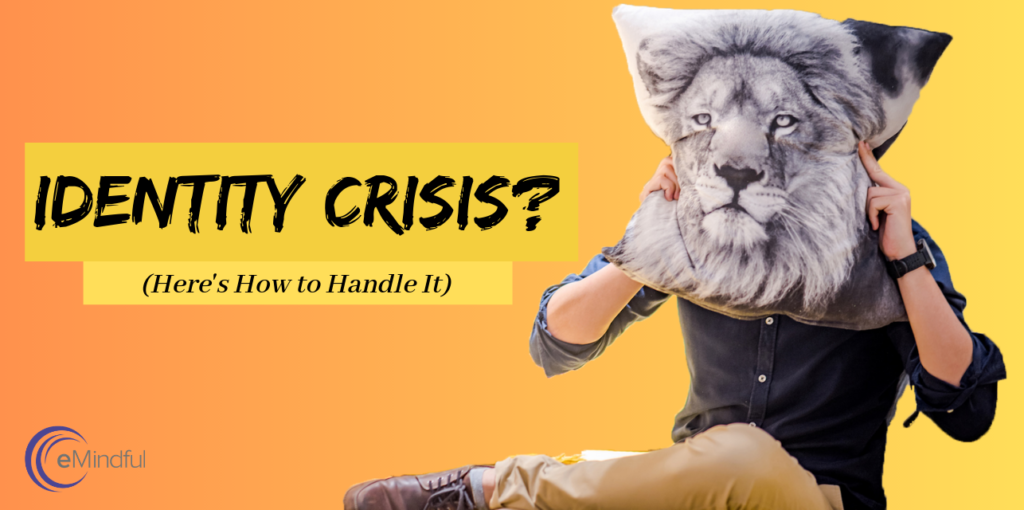
April 16, 2019
Are You Having an Identity Crisis? Here’s How to Handle It
By eM Life Teacher Jennifer Davis
Sometimes I think I’m the only one having an identity crisis. Then, I talk to the people in my life and realize I’m not alone:
- A coaching client is obsessing about a failed venture and desperate to succeed in the next business endeavor to prove he is capable.
- An old colleague is taking a bigger role with a competitor organization, and worries she is being selfish and disloyal.
- A friend is going through a separation after cheating, and is now struggling with whether he is worthy of love after having betrayed trust.
Don’t we all feel as if our identity – as we’d like to see ourselves – is challenged at times? In these moments it can provoke our deepest insecurities and a voice inside questions “Am I capable?” “Am I good enough?” “Am I lovable?”

How We Define Identity Crisis
In the book Difficult Conversations, Douglas Stone, et. al, explains that the conversations we have with others, and also how we talk to ourselves, can threaten our sense of identity causing great distress. The way we perceive ourselves is largely to blame. We underestimate how complex we are and have an aspirational, over-simplified, and typically inflexible perception of ourselves.
I am good. I am capable. I am lovable. When we have experiences to the contrary, we can find ourselves catapulted to the opposing view. I am not good – I cause people pain. I am not capable – I don’t have what it takes. I am not lovable – People leave me. Herein lies the crisis. Without any warning, suddenly we question our view of ourselves.
The reality is we’re complex and our identities can’t be categorized in all-or-nothing terms. Having an honest conversation with someone we care about can cause pain, leaving us feeling guilty and bad about ourselves; and at the same time be the right thing to do.
For me, I now accept that identity crises are a part of life, and ultimately essential for my growth and happiness. “I am not capable” comes to mind when I’m trying out something new in my work. And “I am not good enough” shows up when I choose me-time instead of time with loved ones. While it’s not always pretty, I work to greet these crises with mindfulness and respond from awareness that there’s much more to the story my mind is creating.

Steps You Can Take Ways to Mindfully Overcome Identity Crisis
Explore these mindfulness practices to shift a moment of identity crisis into clarity, compassion and growth.
1. Breathe Yourself Present
In meditation training there is often emphasis on focusing attention on the sensations of the breath. You can expand the practice to focus on any aspect of your experience – thoughts, sensations, or listening to someone. This practice builds the capacity to be more present in our lives and to see ourselves more clearly. Take 10-mindful breaths at the start of your day to become present. And repeat the practice anytime you notice an identity crisis arising.
2. Observe What Plays On Repeat
Instead of automatically buying into your insecurities, practice curiosity. With curious observation of your thoughts and emotions, you’ll likely notice the same themes of insecurity play on repeat in your mind. With this awareness, they take on a familiar and routine quality, and ultimately hold less power. When insecurities arise, simply note, “Ah, yes, Not Capable/Good/Lovable, is playing.”
3. Increase Your Flexibility
Much like our muscles can be stretched to become less rigid and more flexible, so can our self-perception. Bringing mindful awareness into our everyday moments shines a light on the fluidity of our inner experience. We experience different thoughts, moods, energy levels, and physical sensations at different times.
These may change in relationship to whom we’re around, the environment we’re in, how comfortable we are with what’s happening, or how well rested we are. With this awareness we can develop a more flexible self-identity.
4. Up Your Compassion
Let’s face it. Identity crises are a part of life, and they can be physically and emotionally painful. What we need most in these moments is self-compassion. Self-compassion doesn’t mean letting ourselves off the hook when we’ve done something wrong or hurtful.
Instead, it sets us up for reflection and growth by being a powerful antidote to the tendency to self-criticize and self-shame when our identity is challenged – keeping us stuck and preventing us from learning important lessons. Recover and grow in these moments by talking to yourself as you would a best friend or loved one. What would you say to them in a similar situation?
The next time you find yourself doubting that you’re capable, good or lovable take it as a sign. You’re normal. You’re not alone. There is nothing fundamentally flawed in you. Insecurities are part of our human experience. And if you greet them with mindful awareness you can suffer less, grow more, and experience a healthier and more flexible relationship with yourself.
More Ways to Reconnect with Yourself
Incorporating a mindfulness practice goes far beyond our own identity. There are so many ways to reconnect with yourself, to stay present, focused and resilient. Sign up for eM Life today to get a two-week FREE trial.